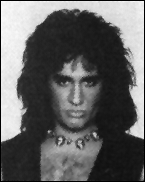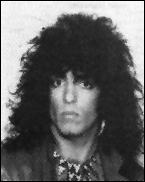![]()
| Simmons & Stanley - In Their Own Words |
|
![]()
|
Gene Simmons and Paul Stanley painted their faces and went on to make Kiss the schock-rockers of their era. Here they tell us what the group was supposed to be like and what it became. |
![]()

![]() e used to practice in this loft in New York, on 23rd Street and Fifth Avenue. That's where we started. Two hundred dollars a month, that was a fortune. And then two years later we're playing Madison Square Garden, headlining. I remember taking the subway, like I always did, after having dinner at my mom's, and landing at 33rd Street, and then buying a ticket, getting in and going backstage and into makeup and then onto the stage and playing. It was two years later, but somehow it seemed like the completion of a ritual.
e used to practice in this loft in New York, on 23rd Street and Fifth Avenue. That's where we started. Two hundred dollars a month, that was a fortune. And then two years later we're playing Madison Square Garden, headlining. I remember taking the subway, like I always did, after having dinner at my mom's, and landing at 33rd Street, and then buying a ticket, getting in and going backstage and into makeup and then onto the stage and playing. It was two years later, but somehow it seemed like the completion of a ritual.
The idea of us seemed so obvious. Nobody besides Alice Cooper had been doing it. You have to have real guts to get up on stage and look weird. And that was our calling card. You get attention real fast, you know, by walking down the street and pulling down your pants. In a sense, we were willing to get up onstage and drop our pants, just to have people say, "My God, look at that."
|
Kiss's Seventies Billboard Top 40 Singles "Rock And Roll All Nite" 11/75 #12 "Shout It Out Loud" 4/76 #31 "Beth" 9/76 #7 "Hard Luck Woman" 1/77 #15 "Calling Dr. Love" 4/77 #16 "Christine Sixteen" 7/77 #25 "Rocket Ride" 4/78 #39 "I Was Made For Lovin' You" 6/79 #11 |
The premise of the band was that each one was going to be a star. All of us trim, tall, white, dark haired, no blond guys. It was going to be very, sort of, defined. Every guy had the same-length hair, very much in the mold of the Temptations. In fact, a lot of our stage movements were ripped off from the old Motown stuff, besides, of course, the bombs and the explosions and all our madness. But there was a method to our madness. It wasn't just chaos.
I remember when we did a showcase for Don Ellis, who was doing A & R at the time at Epic Records. He came in to see us and we were painted up. And he said, "What is this? I don't get it. You guys can't do that." To make matters worse, our drummer's brother was drunk and he threw up all over the floor. Needless to say, Don Ellis walked out.
But the kids liked us. They might have been flabbergasted and unbelievably stunned, and maybe they didn't know what the hell was going on, but they went for it right away, in a big way. The first time we played in a club there was nobody there. The next night there were lines around the block.
And then Neil Bogart heard about us. He was in the process of leaving his record company, Buddah Records, and starting a new company for Warner Brothers, but he didn't know what he was going to call it. But he heard a tape of ours and he signed us right away.
 |
"...I don't know whether our music will last into the next century, but I don't really care. It was relevant for its time." |
When Neil finally came to see us live, we were in makeup and he was shocked. He said, "I don't know about this. I think this kind of garish stuff is over. Forget the makeup and do it my way."
And I remember saying something like, "This is a chance of a lifetime, but we've got to do what we believe. If we can't wear the makeup, we'll go someplace else."
Neil turned around and said, "OK, if you guys really believe in it, I believe in your belief. Let's go."
By the time we played our first big show -- New Year's Eve, 1973 into '74, at the Academy of Music in New York, we were the fourth act on the bill -- I was already into breathing fire.
Of course, on this night when I breathed fire, my hair caught on fire. One of our roadies put it out, but everybody thought it was part of the act.
The mania happened so suddenly. We didn't have a chance to react. All of a sudden we're fucking our brains out every single day of our lives and doing 210, 230 shows a year. It was ten months on the road, four weeks to make a record, and then back out. And we did that for eight years.
It was like, we were Kiss. We could do no wrong. We were supermen. It was almost like a crusade. I think about those guys today who walk down the street with those ghetto-blasters. I'm sure someone says to them, "Don't you feel like a knucklehead, walking down the street and making a nuisance of yourself?"
But the very fact they're a nuisance is giving them a sort of power that nobody else has. And they're getting a response -- whether it's hate or admiration or whatever -- from the people around them. It was exactly the same way with us.
Hey, our music was modern folk music, and I'm obviously proud of it. Somebody bought those records, a lot of people. The songs are good. Now, I don't know whether they will last into the next century, but I don't really care. It was relevant for its time. ![]()
![]()

![]() he first time I became aware of the potential of what you could do on stage was through the Who. The idea of smashing instruments was so beyond my comprehension. Why would anybody want to take their guitar and break it? That means you gotta go get another guitar. But I related to it because it was theater.
he first time I became aware of the potential of what you could do on stage was through the Who. The idea of smashing instruments was so beyond my comprehension. Why would anybody want to take their guitar and break it? That means you gotta go get another guitar. But I related to it because it was theater.
There was also Jimi Hendrix. The idea that this black man could do what he did in front of a white audience was incredible. I remember showing pictures of Hendrix to some of my classmates in junior high school, black classmates, and they were in convulsions, laughing. They never saw anyone so funny looking.
But I think it was Eddie Cochran who really turned me around. I remember being five, six years old, and seeing Eddie Cochran. He was much more intriguing to me than anyone else, and probably because of his bleached blond hair.
Hey, when the Beatles came out, people laughed at them, too. I don't think you can lead a parade and not have people stare at you. The idea of Kiss was to take that kind of thinking to its natural next step.
Initially, we promoted ourselves. We would rent a ballroom, very often at the Hotel Diplomat in New York, which was a hotel for hookers and junkies on 43rd Street, off Broadway. No club would hire us because of how we looked and how loud we played. We weren't ready to compromise, and as a result, most places wouldn't hire us.
I was an art major, so I would draw an ad for a paper like the Village Voice, and then we would put these ads up all over the city. We would find two other local bands that were willing to sign a contract with us agreeing when we'd all go on, and we'd do a mailing to everybody. That's pretty much how we started out.
|
Kiss's Seventies Billboard Top 10 Albums Alive! 10/75 #9 Love Gun 7/77 #7 Alive II 1/78 #10 |
After Neil Bogart signed us, we spent a year or so opening for virtually anybody who would let us open -- Rory Gallagher, Savoy Brown, Manfred Mann -- hard-core British blues bands. And every time we walked out on stage, if people weren't outright laughing, they were hitting one another in the ribs and snickering. I can remember on one occasion, on a show with Savoy Brown -- Michagan, I think Flint. We walked on stage and everyone was just laughing. We were like sacrificial lambs. But when we played, the crowd went crazy. What we lacked in musicianship we made up for in conviction. We did a couple of encores, and after we left, half the audience left. From then on there was a lot more respect. We became like Reverend Ike with Marshall amps.
|
Kiss Lyrics Kiss Videos |
I remember one time my parents came to see us at Madison Square Garden, and there I am on stage playing game-show host to 18,000 people, and I'm wearing tights and high heels and playing with a guitar between my legs, stroking the guitar. I remember saying to myself, "My God, my parents are out there absorbing this." They're watching 18,000 people watching their son, and their son is in makeup and high heels and he's jerking off a guitar. Now, any one of these things would be enough to give them a coronary, but all of them together?
Later on, my father said to me, "I can't believe it. You really did it."
I said, "I told you I would."
But underneath everything, I was still their kid from Queens who was taught the difference between what nice girls do and what bad girls do. I was taught etiquette, I was taught manners. And then I'm out on the road, we finish a gig, go back to the hotel, and there's a line of women waiting outside my door.
I don't know how to contend with that. It was so blatant. The fact that somebody would call your room and say, "Hi, what are you doing?"
And I'd say, "Uh, well, I've got somebody in my room."
And she'd say, "OK, I'll wait in the lobby. Let me know when you're done." I wasn't brought up like that. In fact, it took me a long time to get used to it. ![]()
![]() Reader's Comments
Reader's Comments
No comments so far, be the first to comment.
| Check out the |  |  |
